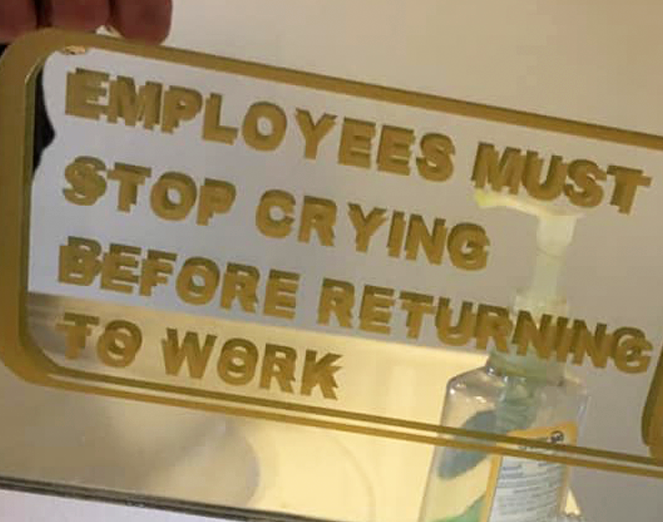

The law should still apply equally to every company, shouldn’t it?


The law should still apply equally to every company, shouldn’t it?


That’s because they like the idea of a Trump dictatorship. They simply assume they’d be on the side that’s going to do the dictating.


Milliardäre sind halt so unglaublich weit weg vom eigenen Erfahrungshorizont, da könnte man sich genauso gut über Smaug den Drachen unterhalten. Menschen, die vielleicht hunderttausend mal mehr Geld haben, als man als Durchschnittsmensch in einem gesamten Arbeitsleben verdienen kann? Da fehlt vielen Menschen komplett das Vermögen, das in irgendein Verhältnis zum eigenen Leben zu setzen.
Da sieht man sich dann lieber in der eigenen, erlebten Umgebung um und tritt dann gerne kräftig zu, am liebsten nach unten.
Point being that installing Chrome isn’t the “trouble” you’re making it out to be, when switching to Edge comes with zero advantage.
But you weren’t asking an open ended question anyway, right?
Conversely, if they’re both evil, why use Microsoft over Google?
People have their browser set up the way they want it, and downloading and installing Chrome to have everything sync back and work exactly the way they want things to work takes all of two minutes.
Why use Edge and spend time and effort to import bookmarks, import passwords, change settings, install extensions etc. only to have the exact same end result that downloading Chrome would have given them in the first place, but with the added annoyance of Microsoft leveraging Edge to nudge them into the Microsoft ecosystem?


That absolutely doesn’t mean that the power to create or disband ministries has to rest with the executive branch.
In fact, it can easily be argued that creating the framework in which the executive branch operates is the domain of the legislative branch - so the creation, merging, splitting or disbanding of ministries should also be a power of the legislative branch.
Or you could argue that it should be a power that should be shared between an administration and parliament, where an administration could introduce a motion to change ministries to parliament, and parliament would have to vote on it.
Lots of possibilities.


Winamp wasn’t a Google project.


As mentioned in the article.


Then I assume you’re aware that the Geneva Convention make one exception where hospitals lose their protection: when they’re used for a military purpose that is harmful to the enemy.
In other words: a warring faction cannot simply set up a military headquarter, a military outpost or a military attack position in a hospital and expect to enjoy the full protection granted to medical facilities while using it to attack the enemy.
You’re aware of that, right?


Except that in this case, the UN is explicitly saying that the numbers they’re quoting cannot be verified and they’re merely cutting the numbers Hamas is giving them.
So the question is: if the IDF cannot be trusted, why should we trust the terrorists?


What does the Geneva Convention say about using civilians as human shields? What does the Geneva Convention say about using hospitals, schools, places of worship as military headquarters or outposts? What does the Geneva Convention say about murdering civilians to prevent them from evacuating from an area that is under attack?


deleted by creator


These cars don’t even go onto highways or areas where accidents are more likely.
Accidents are less likely on highways. Most accidents occur in urban settings. Most deadly accidents occur outside of cities, off-highway.
In dem BGH Urteil steht doch drinnen, dass es anders ausgefallen wäre, wenn der Autofahrer bewusst auf den Polizisten zugefahren wäre
Ja, klar. War aber halt nicht der Fall, und war auch hier bei dem Klimaprotest nicht der Fall.
Noch mal aus dem Fall mit dem BGH-Urteil:
Polizist P möchte einen anfahrenden Autofahrer stellen, indem er sich auf die Motorhaube des Fahrzeugs legt und sich an den Scheibenwischern festhält.
Das ist doch genau die identische Situation mit der Situation hier, wo zwei Demonstranten einen anfahrenden Autofahrer aufhalten wollen, indem sie sich auf die Motorhaube des Fahrzeugs legen und sich festhalten.
Aus diesem sehr spezifischen Einzelfall jetzt irgendwie das Recht herauszulesen, dass man blokierende Fußgänger einfach anfahren dürfte
Gut, dass ich nie behauptet habe, dass so ein Recht existieren würde.
Meine Aussage ist lediglich, dass es keine gefährliche Körperverletzung ist, wenn ein Autofahrer zwei Demonstranten keinerlei Verletzungen zufügt.
Der Punkt ist, dass der BGH entschieden hat, dass keine gefährliche Körperverletzung vorliegt, nur weil ein Autofahrer jemanden auf die Motorhaube nimmt. Und dass das Auto zwar als gefährliches Werkzeug genutzt werden könne, aber dass dies beim jemanden-auf-die-Motorhaube-nehmen ohne denjenigen zu verletzen nicht der Fall war.
Jetzt mag man zwar mit dem BGH-Urteil nicht einverstanden sein - aber ist das nicht genau parallel zu diesem Fall hier? Zwei Demonstranten klammern sich am Auto fest, Autofahrer fährt mit den beiden auf der Motorhaube ein paar Meter weiter, aber niemand kommt zu Schaden?
Okay, zu meinem Verständnis: impliziert “Versuch” nach §224 StGB (2) nicht, dass der Autofahrer die Intention gehabt haben muss, eine gefährliche Körperverletzung zu begehen?
Also, wenn ich zum Beispiel spaßeshalber zwei Kumpel auf meine Motorhaube lade und dann 50 Meter mit ihnen auf der Motorhaube die Straße entlangfahre, dann kann das doch keine “gefährliche Körperverletzung” sein, oder?
Und dann ist da noch das hier:
Beispiel
Polizist P möchte einen anfahrenden Autofahrer stellen, indem er sich auf die Motorhaube des Fahrzeugs legt und sich an den Scheibenwischern festhält. Nachdem der Autofahrer nicht anhält, nutzt er bei der nächsten Kurve die Fliehkräfte und lässt sich auf den Asphalt fallen. Dabei zieht er sich Schürfwunden an Armen und Beinen zu.
Der BGH hat § 224 Abs. 1 Nr. 2 in diesem Fall verneint. Zwar könne ein fahrendes Auto grundsätzlich ein gefährliches Werkzeug sein, so z.B. beim Zufahren auf einen Fußgänger. Die Verletzungen des P seien jedoch, so der BGH, nicht durch eine Einwirkung des Fahrzeuges auf den Körper, sondern durch den Sturz auf den Asphalt entstanden.
Würde das nicht bedeuten, dass - so lange der Autofahrer sein Auto nicht direkt dazu einsetzt, eine Körperverletzung herbeizuführen - auch keine gefährliche Körperverletzung gegeben sein kann?
gefährliche Körperverletzung
Ich brauche hier mal ne Erklärung: wie kann etwas, bei dem niemand verletzt wurde, “gefährliche Körperverletzung” sein?
Ich mein, klar, den Vorsatz kann man durchaus unterstellen. Aber wie genau würde so etwas denn eine gefährliche Körperverletzung darstellen?
Lässt sich aber durch unterschiedliche Helligkeit vermeiden: ein helles Gelb und ein dunkles Grün sollten auch bei Gelb/Grün-Farbenblindheit einfach unterscheidbar sein.
Im schlimmsten Falle sähe eine Version wie schwarz auf weiß, die andere wie weiß auf schwarz aus.
Das ganze hier macht eher einen “Design by Committee”-Eindruck.
So what is it?
Support Ukraine in the war against Russia - or all wars are equally bad, only chickenhawks support wars?